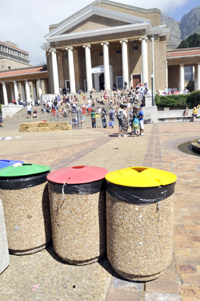Going, going, green
02 March 2009
UCT has launched a programme that will see more than 70% of its daily five to eight tons of solid waste recycled.
Of this, 93% of the dry waste will be recycled.
'Recycle, re-use, reduce' have become watchwords on the campus as UCT establishes itself as an environmentally aware institution, committed to sustainable development in Southern Africa.
UCT is a signatory to the Talloires Declaration, and as such has agreed to practise sound institutional environmental management.
The university launched a recycling campaign several years ago, but it proved too costly to transport waste off campus. Also, the campus lacked the space and resources for its own recycling depot.
Now members of the community can place glass, plastic, tins and general waste in colour-coded bins around campus.
The recycling project is led by the Green Campus Initiative (GCI), a widely supported student and staff volunteer organisation with over 500 members, in partnership with Properties & Services.
Speaking at the launch last week Vice-Chancellor Dr Max Price said: 'As custodians of the university, we have a duty to honour and to preserve our incredible natural surroundings. This duty is not solely that of the university executive, but relies on the understanding, involvement and action of the entire university community to put this into practice."
He added: 'The GCI is a welcome addition to our endeavour to preserve both our resources and our natural heritage and it is an initiative that will keep our attention focused on action and delivery."
UCT now has a solid waste contract with Wasteman, who collect solid waste and recycle this at their plant near Airport Industria.
Eighty percent of UCT's solid waste is fibre- or paper-based, which is ideal for recycling.
Properties & Services' Duke Metcalf, manager of estates and custodial services, said the department had also initiated an awareness campaign in residence kitchens. Staff will be trained to separate cardboard and plastic before contamination by food waste. Food waste is sent directly to landfill sites.
Metcalf said departments are being encouraged to separate white paper in offices to reduce the monthly R60 000 UCT spends on solid waste.
"The plan is to reduce this by half in the first year," he said.
 This work is licensed under a Creative Commons Attribution-NoDerivatives 4.0 International License.
This work is licensed under a Creative Commons Attribution-NoDerivatives 4.0 International License.
Please view the republishing articles page for more information.










